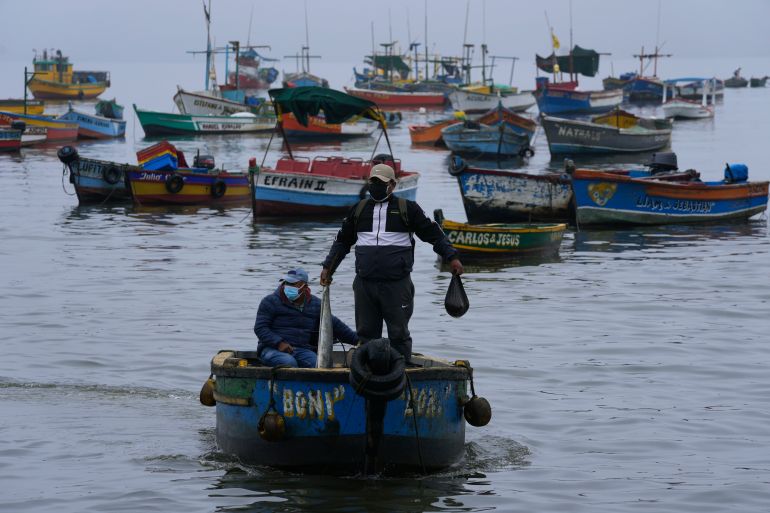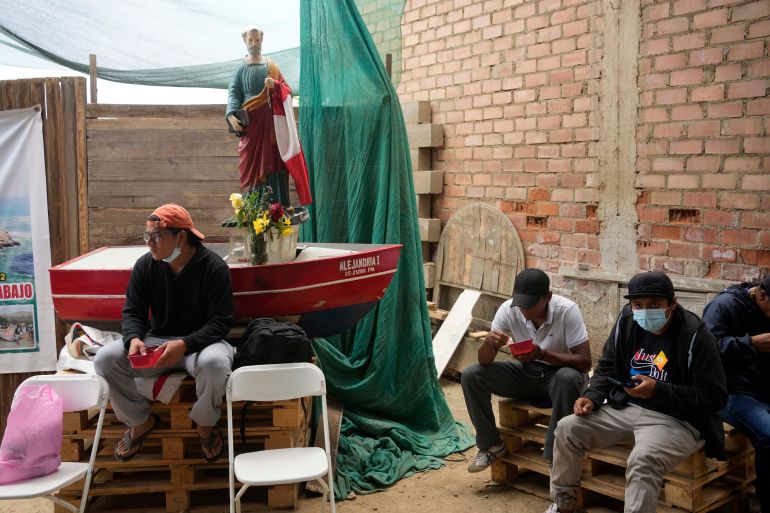Peru’s ‘catastrophe’ oil spill slams small-scale fishermen
The large spill is having a devastating effect on ‘poverty line’ fishermen who depend on small daily catches to make a living.

A huge recent oil spill in Peru which the government called an ecological “catastrophe” has wreaked havoc on the lives and livelihoods of many fishermen who rely on the small amounts of fish they harvest close to the shore for their daily income.
Walter de la Cruz scrambled down a large sand dune in the fog to reach a rock overlooking the Pacific Ocean, where he has fished for 30 years. He cast a hook into the waters off Peru’s coast several times, with no luck. One attempt yielded a piece of plastic stained with oil.
Keep reading
list of 3 itemsPeru oil spill: Judge bars Repsol executives from leaving country
Peru community plans to restart blockade of mine road amid truce
De la Cruz, 60, is one of more than 2,500 fishermen whose livelihoods have been cast into doubt as a result of the large crude-oil spill at the Spanish-owned Repsol oil refinery on January 15.
“We are desperate,” he said, counting on his fingers the debts that overwhelm him, including a bank loan, bills for water, electricity, gas, and school supplies for his two grandchildren.
The spill has had a devastating effect on fishermen who are among the most economically vulnerable in Peru. They harvest small amounts of fish very close to the coast, sometimes from small boats and sometimes from the shore, said Juan Carlos Sueiro, an expert on the economics of fishing with the international conservation group Oceana.
“They are on the poverty line. Their income varies from day to day,” he said.
Peru has characterised the spill of 11,900 barrels in front of a Repsol refinery as its “worst ecological disaster.” The spill happened when the Mare Doricum, an Italian-flagged tanker, was unloading oil at the La Pampilla refinery, just off Peru’s coast north of the capital. The ship’s captain told the South American country’s Congress that oil spilled into the ocean for at least eight minutes.
A report by United Nations experts estimates it involved about 2,100 tonnes of crude, well above the 700 tonnes the International Tanker Owners Pollution Federation Limited considers the threshold for a large spill — and an unprecedented amount for the type of crude that leaked. The oil was extracted from Buzios, the world’s largest deep-water oil field and the most productive in Brazil.
Peru — which has a vast informal economy — does not have exact data on the number of fishermen affected, or of the people on the docks and ports who depend on the fishing industry, including restaurants, food vendors, and those who rent sun umbrellas or boats.
De la Cruz said he knew immediately that the oil would halt for the first time the activity carried out for centuries on Peru’s Pacific coast.
“I saw the fruits of my livelihood destroyed,” he said. “It’s like if you have a store and someone comes and sets it on fire.”

Shortly after the spill, the government announced that it was looking into giving financial aid to those affected. Authorities took three weeks to come up with a list of 2,500 fishermen whom they would help. Two weeks after that, the government said it would now be Repsol which would give as much as $799 to each of the 5,600 people affected to compensate them for the income they have lost because of the spill.
Many fishermen here do not have a certificate or papers to prove it is their livelihood. De la Cruz does not. But he knows that he has been coming here for 30 years with a basket to be filled on his back. He normally sells or trades the fish with the owners of restaurants or local homemakers, and takes some home to his wife to prepare in dishes that can be sold to neighbours.
Peruvian President Pedro Castillo visited the area, passed by De la Cruz, and promised to help. After looking at the puddles of oil, he shook his head and said: “This can’t be.”
On another beach, Castillo had picked up oil-soaked sand and acknowledged the effect of the spill. “What is the use of giving nets if they no longer have a place to fish?” he said.
But those presidential words, which ignited De la Cruz’s hopes, have not borne fruit. More than a month after that visit, state aid does not exist.
“The days pass and we don’t receive anything,” he said.
